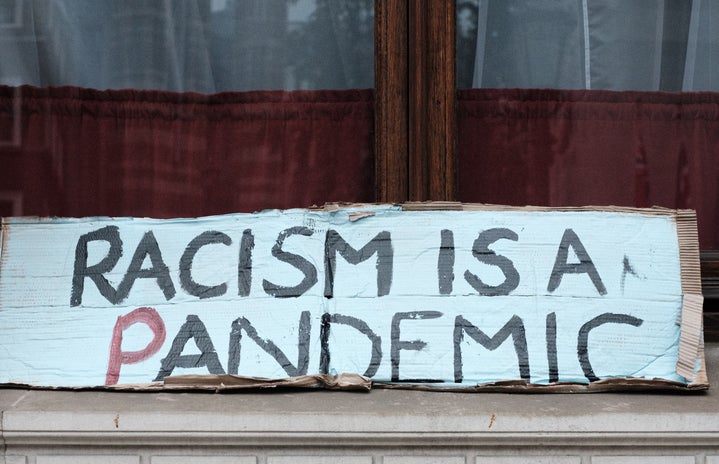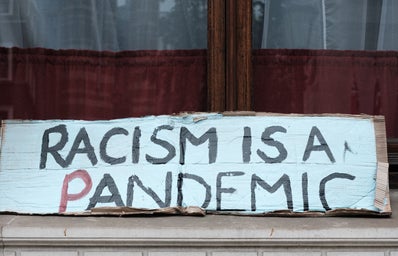In the past year, COVID-19 has taken a lot from us. There are no more concerts, no more in-person graduation ceremonies, and no more thinking that things are getting back to how they were pre-March 2020.
Though we miss these happy moments, COVID-19 has taken more than just our social lives. Along with the half million people that have died from COVID-19 in the United States, it has taken away the ability for Asian Americans to exist without being blamed for a global pandemic. It has taken away the ability for elderly Asian Americans to walk home without being violently attacked. It has taken away the ability for Asian Americans to feel safe in this country.
For the past year, Asian Americans have been targeted for xenophobia-fueled hate crimes resulting from the Coronavirus pandemic.
From March 19 to December 31, 2020, there have been reports of 2,808 incidents of racism and discrimination towards Asian Americans across the nation.
Anti-Asian attacks have become more relevant in the media recently. Along with the regular racist comments that have become normalized and considered humorous in American society, extremely violent initiatives are frequently occurring.
Many Asian Americans, specifically elders, are being discriminated against — even killed.
Earlier this year, Vicha Ratanapakdee, an 84-year-old Thai man, was deadly assaulted while walking around his neighborhood in San Francisco, California.
Just this month, Noel Quintana, a 61-year-old Filipino man, was slashed across the face with a boxcutter while on the New York subway commuting to work.
Jeffrey Chang, a Chinese father, got carjacked while making a DoorDash delivery in San Francisco, California on February 6. His two children, ages 4 and 1, were in the car at the time. Luckily, they were both found shortly after the kidnapping.
These attacks are just from the past two months alone. Asian Americans face a history of being brutally discriminated against in the United States. Unfortunately, racism is nothing new for this community.
In 1982, Vincent Chin, a Chinese American 27-year-old, was beaten to death by two white men who blamed Asian Americans for taking their jobs.
As a result of this disturbance, several activists joined together to form the American Citizens for Justice, a pan-Asian American civil rights organization.
The incident served as a brutal wake-up call within the Asian American community. An attack like this could happen to any Asian American person.
As of the past year, Asian Americans are being used as the scapegoat during the Coronavirus pandemic.
By referring to COVID-19 with ethnicity-based terms such as the “Chinese virus” and the “Kung flu,” Donald Trump places the blame on Asians for the widespread pandemic.
Because Trump is in a position of power, people excuse his racist behavior. They see it as validation and permission to act prejudicially.
In a time of distress and uncertainty, Trump justified xenophobia towards Asian Americans, and he may have even promoted it by continuously referring to COVID-19 with these racist terms.
When asked why he keeps using these terms to describe the Coronavirus pandemic, Trump responded:
“It’s not racist at all. No, not at all. It comes from China. That’s why. It comes from China. I want to be accurate.”
In another interview, he was asked if using these terms would put Asian Americans at risk for being targeted.
He responds, “No, not at all. I think they would probably agree with it 100%.”
While he thinks that Asian Americans would agree with the use of these terms, the statistics disagree.
A report by the NYPD reveals that anti-Asian hate crimes have increased by 1,900% in the past year.
Several other people in positions of power disagree, as well.
Alex Azar, the director of the Centers for Disease Control and Health and Human Services Secretary, claims that calling COVID-19 the “Chinese virus” is inappropriate and inaccurate.
“Ethnicity is not what causes the novel coronavirus.”
Also scrutinizing Trump, the executive director of WHO’s emergencies program Dr. Mike Ryan said, “It’s really important we be careful in the language we use lest it lead to the profiling of individuals associated with the virus.”
For this reason, the WHO carefully decided to give the disease the name Coronavirus in order to prevent “unintended negative impacts by stigmatizing certain communities.”
Following President Biden’s inauguration, he signed a memorandum condemning and combating racism, xenophobia and intolerance against Asian Americans and Pacific Islanders in the United States.
This is a positive step forward towards change. However, Asians are still constantly facing discrimination and injustice within this country.
We need to stand in solidarity to fight against racism within this country. We cannot stay silent about the anti-Asian violence occurring in America.
As we continue to live through this pandemic, remember to wash your hands, stay at home, and stop the hate.


